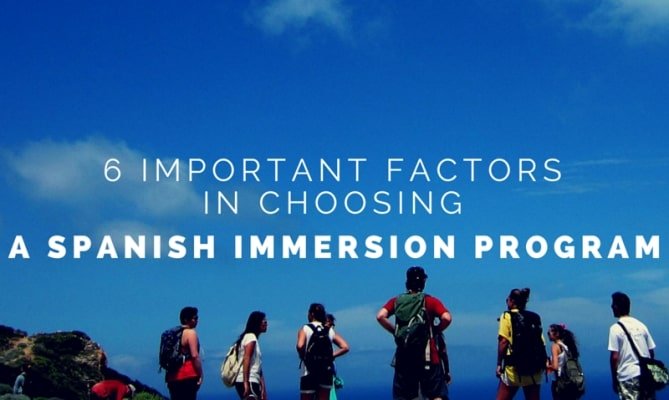6 important factors in choosing a Spanish immersion program
Thinking about immersing yourself in a Spanish speaking country while studying the language? To get the most of your experience, you need to do more than just choose the country where you will study. Sure, the accent you want to develop is important, but choosing a great Spanish program in that country is equally important. Here are the 6 important things to keep in mind when choosing a Spanish immersion program.
1. Qualifications of the institution
First of all, look into the qualifications of the institution that offers the course and make sure it is a DELE certified school. This means they are certified to teach Spanish as a Second Language (DELE is a Spanish acronym, hence the different lettering). This gives you total assurance about the quality and content of the courses.
2. Teachers, materials and programs offered
Ask about the teachers, materials and programs offered. It is vital to have an idea about the people who are going to teach you and what kind of focus the program has. Of course, make sure that the focus is in line with your interests.
3. Course’s curriculum
Check the course’s curriculum and make sure that it covers all the major skill areas: reading, listening, writing, speaking and grammar (as a transverse point). If you are a beginner, look for a course that has a conversational focus. This will give faster results as you gain the skills you need to continue your practice in everyday settings outside of the classroom.
4. Cultural complement
Following point number three, it is important that the course offers a cultural complement as well. There is nothing more helpful than the real life-immersion that a course can give you. In addition to being extremely effective, this will also make your classes a lot more fun.
5. Number of students per course
Check the number of students per course. Depending on your learning style, your time, and the learning rhythm you look for, larger or smaller classes may be better. Of course, programs that offer personalized classes are ideal. That way, your teacher can focus more deeply on your weaknesses and at the same time teach material related to your interests.
6. Do you feel comfortable?
Lastly, make sure you feel comfortable and confident about the school you choose, and that you find it fun! If you don’t like the course, you can always look elsewhere or seek out private tutoring as an alternative. Make sure you answer these 6 questions before you end up inscribed in a lengthy course that you find boring.




